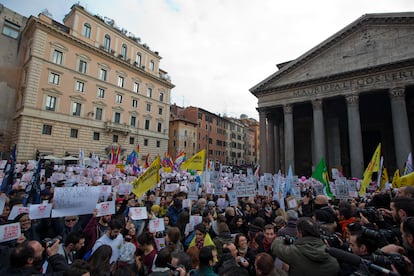Italian government limits parental rights of gay couples
The city of Milan has been told to stop officially recording both parents in same-sex couples on city registers

Gay rights activists on Tuesday denounced as homophobic moves by Italian Premier Giorgia Meloni’s far-right-led government to limit recognition of parental rights to the biological parent only in families with same-sex parents.
In a move that is expected to impact hundreds of families, the government has told the city of Milan to stop automatically recording both parents in same-sex couples on city registers. It was the last major city to continue the practice that had been briefly adopted in Rome, Turin, Naples and elsewhere after Italy’s high court in 2016 made it easier for same-sex couples to adopt a partner’s biological child.
The piece of bureaucracy is key to recognizing parental rights for a range of everyday situations like authorizing medical treatment or participation in class outings.
The president of Rainbow Families, Alessia Crocini, charged that Rome’s move ordering Milan to stop automatically registering both parents in same-sex households exposed the government’s homophobia. The government has issued no official statements on the move.
“This government is the maximum expression of homophobia,’’ she said. “Meloni says that for a child to grow up well, they need a mother and father, even if decades of research say otherwise. It is insulting to hundreds of thousands of families with two same-sex parents.”
Yuri Guaiana, of the activist group All Out, said the move “throws thousands of families into uncertainty.’’
News of the move, which had been communicated to Milan Mayor Giuseppe Sala by the state-appointed prefect, came on the same day that a Senate commission blocked an attempt to recognize birth certificates of the children of same sex couples issued by other EU states.
Sala pledged to fight for a law conferring rights equally on same-sex parents, but said in the meantime he could not risk putting workers in the city registry office at odds with the government’s decision.
Sala’s administration not only transcribed documents from other countries recognizing the rights of gay and lesbian parents, but also conferred the same recognition on same-sex parents of children born in Italy.
Other cities had already stopped the practice as administrations changed hands and political winds shifted in Rome. In the absence of such recognition, the non-birth mother or father must go through the adoption process to establish parental rights – which can take years.
Former Turin Mayor Chiara Appendino, the first mayor to recognize the rights of both same-sex parents without seeking court approval, said the new ban “is only the last slap against these families.” She joined Sala’s call for a law recognizing their rights.
Italy’s Gay Party, formed in 2020 to give political heft to the fight against anti-gay discrimination, estimates that some 150,000 children are impacted by Italy’s failure to recognize the rights of both parents in same-sex marriages. That includes hundreds in the city of Milan.
Gay Party spokesman Fabrizio Marrazzo called on Italian mayors to subvert the government’s request and register both same-sex parents in an act of civil disobedience.
“When norms are discriminatory, mayors need to have the courage to say so,’’ he said.
Sign up for our weekly newsletter to get more English-language news coverage from EL PAÍS USA Edition
Tu suscripción se está usando en otro dispositivo
¿Quieres añadir otro usuario a tu suscripción?
Si continúas leyendo en este dispositivo, no se podrá leer en el otro.
FlechaTu suscripción se está usando en otro dispositivo y solo puedes acceder a EL PAÍS desde un dispositivo a la vez.
Si quieres compartir tu cuenta, cambia tu suscripción a la modalidad Premium, así podrás añadir otro usuario. Cada uno accederá con su propia cuenta de email, lo que os permitirá personalizar vuestra experiencia en EL PAÍS.
¿Tienes una suscripción de empresa? Accede aquí para contratar más cuentas.
En el caso de no saber quién está usando tu cuenta, te recomendamos cambiar tu contraseña aquí.
Si decides continuar compartiendo tu cuenta, este mensaje se mostrará en tu dispositivo y en el de la otra persona que está usando tu cuenta de forma indefinida, afectando a tu experiencia de lectura. Puedes consultar aquí los términos y condiciones de la suscripción digital.








































